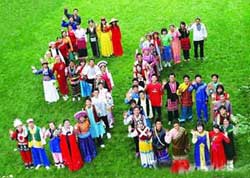
Putonghua, or Mandarin as it is known in the West, now not only
serves as the common language for the Han Nationality, which
account for nearly 94 percent of China's population, but also for
people from the 55 ethnic minority groups in the country.
Wu Sashimi, vice director of the State Ethnic Affairs
Commission, said on Friday that many of the minority ethnic
populations can now communicate in Mandarin.
"Mandarin has become the de-facto lingua franca for all Chinese
regardless of their ethnic groups," Wu said.
The central government set Mandarin as China's standard speaking
common speech in 1956, and committed itself to popularizing the
speech nationwide.
According to the constitution and relevant laws, ethnic
minorities are free to choose to learn either their own languages
or Mandarin, or both.
"At present, more than half of the ethnic group population still
use their own languages," Wu noted.
Fifty-three of the 55 ethnic groups in China each have their own
languages. And 22 of them have altogether 28 written forms of their
respective spoken languages, according to Wu.
Statistics from the Chinese language work commission under the
Ministry of Education show 63.94 million people from ethnic
minority groups learnt ethnic languages first, taking up nearly 60
percent of the total ethnic minority population, and 61.4 million
people communicate in their own speech at home.
State Councilor Chen Zhili said on Friday at a symposium marking
the 50th anniversary of the central government's decision to
popularize Mandarin that China's 50-year campaign has made a "great
contribution" to China's economic, educational and cultural
development, as well as to the "national cohesion" and enhanced
international exchanges.
(Xinhua News Agency April 1, 2006)

